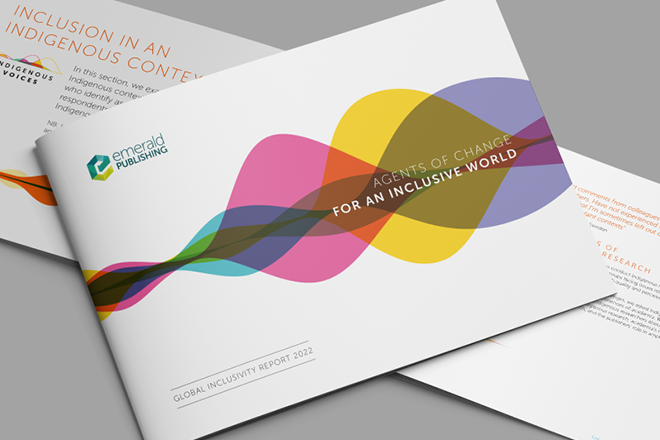In 2020, we commissioned our first global inclusivity report to shine a light on inclusion, the issues facing our communities, and the actions we can take to create a fairer society.
Two years on, our world continues to face uncertainty and ongoing challenges. We have the ongoing COVID-19 pandemic, the economic and humanitarian crises caused by the Russian invasion of Ukraine, and worsening issues around poverty and social equality.
To understand how perceptions around inclusivity have evolved since our last report, in June 2022 we commissioned a second global inclusivity report. The report presents the results of a survey that we sent to over 150,000 researchers across the globe who have previously authored with Emerald, as well as other academics via social media.
Both reports centre around core questions to provide year-on-year comparisons, covering academic perceptions and experiences of inclusion, the benefits of and barriers to inclusion within academia and research, the role of the publisher in promoting inclusion, and actions for change.
In 2022, we added a new topic area on Indigenous research to support our mission to amplify voices from diverse and historically marginalised backgrounds. This section explores challenges within Indigenous research and what academia and publishers can do to promote inclusion.
How to navigate
Use the 'On this page' and 'In the report' menus to quickly see and jump to content you're interested in.
On this page
Background
The UN’s 2030 Agenda for Sustainable Development has set the pace for creating a fair and sustainable future for all. Its 17 Sustainable Development Goals (SDGs) tackle some of the greatest environmental, health and social challenges of our time, from climate change and poverty to food insecurity and education inequalities.
Government, business, and civil society each have a role to play in making progress on the SDGs. The global research community is another key partner, offering new insights and solutions that can help decision makers take transformative action for a better world.
Publishers can play their part in furthering the SDGs through activities that prioritise research that aligns to real world challenges, supporting underrepresented researchers, and offering a range of publishing and dissemination options.
How we support the SDGs
Emerald is a founding signatory of the UN SDG Publishers Compact and is championing the SDGs through its content and wider initiatives. Our content focuses on mission-led research that aligns to multiple SDGs under the goals of Fairer Society, Healthier Lives, Responsible Management and Quality Education for All.
In support of the 2030 Agenda and its vision of a world where no one is left behind, we aspire to publish research that gives all voices an opportunity to be heard and understood. We’re a signatory to the Joint Commitment for Action on Inclusion and Diversity in Publishing and currently publish research from diverse communities across more than 130 countries.
Ways we promote inclusion
To advance diversity and inclusion in research we’ve launched various publishing opportunities, including special open access issues and supplements. For 2022, we are focusing on Indigenous communities and have commissioned content on issues such as stewardship, health and wellbeing, diversifying the curriculum, and diversity within the boardroom. We are also raising awareness of the issues through reports, blogs, podcasts, campaigns and discussions.
Publishers need to take decisive action to change the status quo, so we will look to create more opportunities for Indigenous research and increase representation of Indigenous voices.
We strive to represent and include diverse groups across our publishing activities and in the ways we work. This means we foster equity, diversity and inclusion within our editorial boards, authorship and case studies, and we only support, sponsor and work in partnership with organisations that endorse these values.
The principles of equality, diversity and inclusion are important in the workplace too. So, in 2021, we launched the Equity, Diversity and Inclusion Network to challenge Emerald to live up to its commitments, drive change and embed best practice.
Methodology & demographics
Our approach
- Total responses received via the Literati database of Emerald authors and researchers and social media respondents were 1,199
- The survey was open between 16 June and 8 July 2022 and was sent to 161,867 contacts
- N&WE and UK responses have been combined in the data tables to create North & West Europe
Limitations
- The report includes global responses, with regional breakdowns available where possible. All regions had a minimum of 100 responses, except for Latin America (45) and Australasia (76), so these results should be treated with caution
- Two career stages have low sample sizes (see a PDF of the full demographic breakdown*):
- Student (48)
- 16–19 years post PhD (66).
- While the 2020 and 2022 reports can’t be compared in every instance, comparable 2020 data is included in brackets
* This content can be made available in a more accessible format if you need it; please send us a message if you have an accessibility issues with these pages, and we'll be in touch about your needs.



